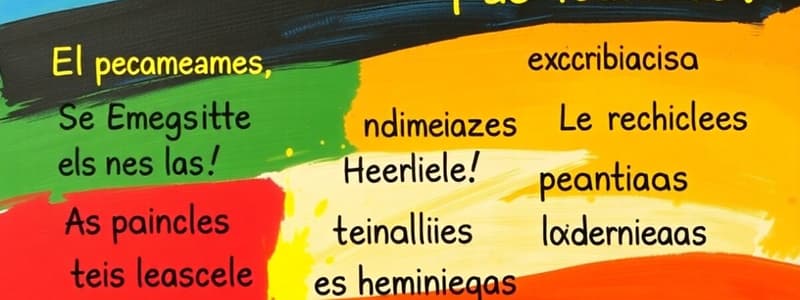Podcast
Questions and Answers
Which expression is commonly used in Spanish-speaking countries to express disbelief or surprise?
Which expression is commonly used in Spanish-speaking countries to express disbelief or surprise?
- ¡Qué vaina!
- ¡Qué chévere!
- ¡Qué asco!
- ¡No me lo puedo creer! (correct)
The expression '¡Qué padre!' is commonly used in Spain to mean 'How cool!' or 'How great!'
The expression '¡Qué padre!' is commonly used in Spain to mean 'How cool!' or 'How great!'
False (B)
What expression would you use to say 'Get well soon!' to someone in Spanish?
What expression would you use to say 'Get well soon!' to someone in Spanish?
¡Que te mejores! / ¡Ponte bien!
If someone sneezes, you would say '______' in Spanish.
If someone sneezes, you would say '______' in Spanish.
Match the Spanish expressions with their English meanings:
Match the Spanish expressions with their English meanings:
Which of the following expressions would someone in Mexico most likely use to express that something is 'cool'?
Which of the following expressions would someone in Mexico most likely use to express that something is 'cool'?
The expression A ver translates to 'Goodbye'.
The expression A ver translates to 'Goodbye'.
What are three common Spanish words that can be used as filler words or to introduce a topic?
What are three common Spanish words that can be used as filler words or to introduce a topic?
Flashcards
Vamos a ver!
Vamos a ver!
An expression used to anticipate something. It means 'Let's see!'
No me digas
No me digas
Expresses disbelief or shock. Means 'You don’t say!'
¡No me lo puedo creer!
¡No me lo puedo creer!
Expresses surprise or disbelief, meaning, 'I can’t believe it!'
¡De verdad!
¡De verdad!
Signup and view all the flashcards
¡En serio!
¡En serio!
Signup and view all the flashcards
¡Que te mejores!
¡Que te mejores!
Signup and view all the flashcards
¡Felicidades!
¡Felicidades!
Signup and view all the flashcards
¿Verdad?
¿Verdad?
Signup and view all the flashcards
Study Notes
- ¡Vamos a ver!
- An expression to show anticipation
- ¡Qué barbaridad! (Spain) / ¡Qué bárbaro! (Latin America)
- “How awful!”; “How terrible!”
- ¡Qué chévere! (Venezuela, Colombia, Ecuador, Panamá, Puerto Rico, Dominican Republic) / ¡Qué chido! (Mexico)
- “How cool!”
- ¡Qué padre! (Mexico)
- “How great!”; “How cool!”
- ¡Qué vaina! (Venezuela, Colombia, Ecuador, Panamá, Puerto Rico, Dominican Republic)
- “What a drag!”
- No me digas
- “You don’t say!”
- ¡No me lo puedo creer!
- “I can’t believe it!”
- ¡De verdad!
- “Really!”
- ¡En serio!
- “Seriously!”
- ¡Qué susto!
- “What a scare!”
- ¡Ay, Dios mío!
- “Oh my God!”
- ¡Madre mía!
- “My God!” (Spain)
- ¡Caramba!
- “Good heavens!”; “Wow!”
- ¡Válgame Dios!
- “Good heavens!”
- ¡Jesús!
- Said when someone sneezes
- Salud
- Said to someone who has sneezed
- ¡Qué asco!
- “How disgusting!”
- A mí me da(n) asco...
- I think ... is/are disgusting.
- ¡Qué coincidencia!
- “What a coincidence!”
- ¡Qué raro!
- “How strange!”
- ¡Qué pesado!
- “How annoying!”
- ¡Ten cuidado!
- “Be careful!”
- ¡Ojo!
- “Careful!”; “Watch out!”
- ¡Piénsalo bien!
- “Think it over!”
- ¡No te olvides de... !
- “Don’t forget to…!”
- ¡Que te mejores!
- “Get well soon!”
- ¡Ponte bien!
- “Get well soon!”
- ¡Felicidades!
- “Congratulations!”
- ¡Enhorabuena!
- “Congratulations!”
- ¡Salud!
- “Cheers!”; “To your health!”
- ¡Buen provecho!
- “Enjoy your meal!”
- ¡Qué aproveche!
- “Enjoy your meal!” (said by the server)
- ¡Feliz cumpleaños!
- “Happy birthday!”
- ¡Feliz Navidad!
- “Merry Christmas!”
- ¡Feliz Año Nuevo!
- “Happy New Year!”
- ¡Felices Pascuas!
- “Happy Easter!”
- ¡Que tengas un buen día!
- “Have a good day!”
- ¡Que te vaya bien!
- “I hope things go well for you!”
- ¡Cuídate!
- “Take care!”
- ¡Nos vemos!
- “See you!”
- ¡Qué tengas suerte!
- “Good luck!”
- ¡Chao!
- “Bye!”
- Bueno
- "Okay" / "Good" / "Well"
- Can be used as a filler word, similar to "um" or "so" in English
- Pues
- "Well" / "So" / "Then"
- Used to introduce a topic, respond to a question, or indicate a consequence
- ¿Verdad?
- "Right?" / "Isn't it?" / "Really?"
- Used to seek confirmation or agreement, turning a statement into a question
- ¿No?
- "Right?" / "Isn't it?"
- Short for "¿Verdad?", also used to seek confirmation or agreement
- ¿Me entiendes?
- "Do you understand me?"
- Used to check if someone is following what you're saying
- ¿Sabes?
- "You know?"
- Can be used as a filler, to soften a statement, or to check if someone knows something
- A ver
- "Let's see" / Look
- Used to indicate that you are going to check something, think about something, or give an example
- O sea
- "I mean" / "In other words"
- Used to explain something further or clarify your meaning
- Vale
- "Okay" / "Alright"
- Common in Spain to express agreement, acceptance or understanding
- ¿Sí?
- "Yes?" / "Really?"
- Used as a response when you didn't hear or understand something, or to show surprise
- Tipo
- "Like" / "Kind of"
- Used informally, especially by young people, as a filler word or to describe something in general terms
- ¿Entiendes?
- Do you understand?
- ¿Comprendes?
- Do you understand?
- ¿Qué dices?
- What are you saying?
- ¿Cómo?
- How?
- ¡Claro!
- Of course!
- ¡Por supuesto!
- Of course!
- ¡Exacto!
- Exactly!
- ¡Desde luego!
- Of course!
- ¡Claro que sí!
- Of course! (yes)
Studying That Suits You
Use AI to generate personalized quizzes and flashcards to suit your learning preferences.




